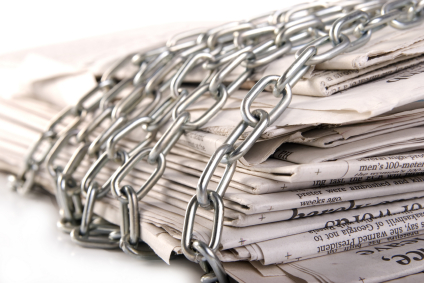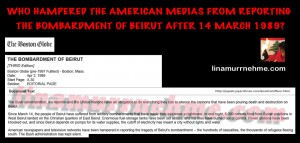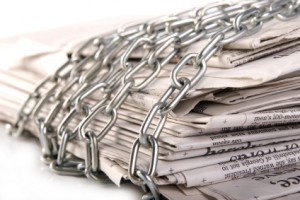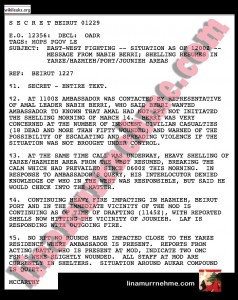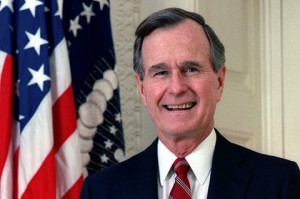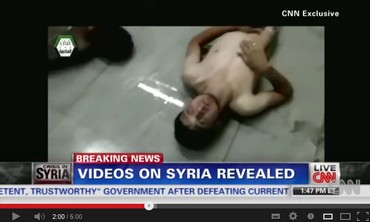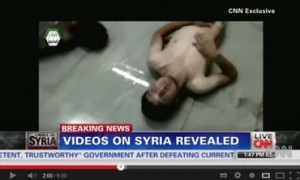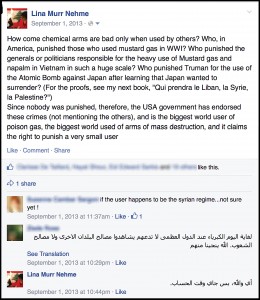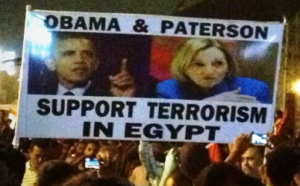Contrary to preconceptions, the American media are, in the area of foreign politics, heavily influenced by unscrupulous entities that are, sometimes, related to the government.
This subservience is not obvious: the journalists in the United States are impertinent in the area of domestic policy. So the average American does not know enough about foreign politics to be able to check the data provided to him… or to know what is hidden from him.
While I was in Lebanon in February 1989, I had ordered sets of prints of some of my paintings. I had to go from Jounieh to Cyprus by boat, in order to return to the USA, where I lived, near Boston. I could not know that I had taken the last boat, and that heavy bombardments would close this port a few hours after my departure.
Three weeks later, as I needed to have a few samples of the prints, I called my parents in Lebanon and asked if they had received my prints. My father said:
“We are working as fast as we can. But we are under unceasing heavy Syrian bombardments. You know we are at war, don’t you?”
“No. I did not know. Otherwise I would not have asked for my prints.”
“We are experiencing the worst bombardments we have ever known. But we are happy, because at long last, Lebanon has declared war on Syria.“
It was huge: the war had lasted so many years, and the Syrian army was occupying part of Lebanon. The Lebanese army would fight against the Syrians at some places, yet, the Lebanese politicians had never dared talking of bombarding the Syrian army in Lebanon openly.
I called the Lebanese journalists I knew in America. They confirmed the existence of a blackout in the American medias, concerning Lebanon. One of them faxed me a sample of a letter to sign and send at the White House to George H.W. Bush, who was then president. In this letter, the sender demanded that the American media told the truth about the Syrians in Lebanon. I signed the letter and put it in an envelope which I stamped. I wrote on the envelope the name and address of George Bush, and I posted it, without hoping much of a result.
After a few days, the media stopped the blackout. I called the same journalist and I asked him what had happened. He said: “Fifty thousand of us sent letters to the White House. That’s why the media have stopped the blackout. Read the Boston Globe“.
On 2 April 1989, the Boston Globe wrote in its editorial page:
“Since March 14, the people of Beirut have suffered from artillery bombardments that have made their existence a nightmare. In one night, 5,000 rockets fired from Syrian positions in West Beirut landed on the Christian quarters of East Beirut. Enormous fuel-storage tanks have been set ablaze, and the fires have burned out of control. Power stations have been knocked out, and since Beirut depends on pumps for its water supplies, the cutoff of electricity has meant a city without lights and water.
“American newspapers and television networks have been hampered in reporting the tragedy of Beirut’s bombardment — the hundreds of casualties, the thousands of refugees fleeing south. The Bush administration has kept silent.”
Who could hamper all the American media from doing their job while the Bush administration was also keeping silent? And why?
The effects of this hampering are amazing. In the period from March 14 until the editorial cited above, the Boston Globe’s articles make it appear that nothing is happening in Lebanon except truces and some fighting between Christians and Muslims or Druzes. Below are the abstracts of all seven articles about Lebanon from March 14 to April 1, taken from the Boston Globe archives. Three of them are about truces, four of them describe the fighting as being between Christians and Muslim militiamen without Syrian involvement, one of them describes the Syrian army as not involved (but re-deploying just in case), zero describe Syria as being involved in the fighting, and only one (a third update of a former article) mentions that a certain General leading a “Christian Cabinet” says the fighting is against Syrian forces.
- 40 Lebanese Die in Sectarian Clashes, Mar 15, 1989: At least 40 people were killed, mostly civilians, on March 15, 1989 in Beirut as Christian army units and Moslem militiamen fought an artillery duel which rained hundreds of shells on Beirut’s residential areas.
- 40 LEBANESE DIE IN SECTARIAN CLASHES, Mar 15, 1989 (third update): Gen. Michel Aoun, who leads a Christian military Cabinet and commands 20,000 Christian troops, said yesterday: “It’s a war of liberation against Syrian occupation forces. The battle has begun.” Aoun’s headquarters were damaged in the shelling. In midafternoon, police said, Aoun’s forces shelled the border town [sic] of Chtaura [in the center of Lebanon], command headquarters for Syrian troops in east Lebanon’s Bekaa Valley, and cut the Damascus-Beirut highway. Gen. Sami Khatib, chosen by [Salim Hoss] to command the army’s 22,000 Moslem soldiers, has kept out of the Christian-Druze battle. His troops are poorly equipped and scattered throughout Lebanon’s Moslem territory, which generally covers West Beirut, the slums to the south of the capital, and south Lebanon and coastal areas.
- Lebanese Observe Uneasy, Unofficial Truce, Mar 16, 1989: Rival Christian and Moslem forces, pausing after two days of fighting that killed 50 people and wounded others, observed an uneasy and undeclared truce amid warnings of renewed fighting.
- Shelling Continues in Hills Near Beirut, Mar 19, 1989: Christian-led army troops and pro-Syrian Moslem militiamen battled with tanks and artillery in the hills overlooking Beirut. Reasons for the latest fighting are presented.
- Artillery Duels, Air Strikes Rock Lebanon, Mar 21, 1989: Violence erupted between Christian and Moslem forces in Lebanon while Israeli planes bombed Palestinian positions in the Bekaa Valley.
- Syria Troops Redeployed Near Beirut, Mar 23, 1989: Syria moved its troops in Beirut to new positions and called for the ousting of Christian leader Michel Aoun. The military reorganization is in case of war across divided Beirut between Aoun’s troops and Syrian Moslems.
- Lebanese Truce Starts; Shelling Subsides, Mar 29, 1989: The Lebanese army has agreed to a cease fire to give the Arab League a chance to negotiate an end to Lebanon’s crisis.
Such a subservience is amazing in a country that claims to have the freest press in the world. In a free country, there is no need to send letters to the President in order to have journalists report so huge a tragedy. Money or other forms of pressure make the American media accept, in the area of international politics — the most important area — a self-censorship similar to the one that terror imposes in dictatorships.
The White House was very well informed about the situation in Lebanon: that’s what ambassadors and secret services are for. The following telegram published by Wikileaks, was written on 14 March 1989 by John McCarthy, the American ambassador in Beirut. It speaks of the bombardment, and says that Nabih Berri, head of the Amal movement, wanted the ambassador to know that he was not the one who had bombarded the Lebanese MOD (Ministry of Defense). Berri implied that the Syrian army was the one to have bombarded the MOD: besides Berri’s Amal, there was no other armed force having a heavy artillery capable of doing such shelling:
Why did George H.W. Bush keep silent about the tragedy of Lebanon in March 1989, despite being kept informed on a daily basis by his diplomats and his intelligence services?
Perhaps because George Bush wanted to leave a free hand to the Syrian army and the militias financed by Saudi Arabia and Syria. He would later approve the Syrian invasion of Lebanon (13 October 1990). A few days earlier, he even prepared the American opinion at a White House Briefing for Representatives of the Arab-American Community, on 24 September 1990. In this briefing, he refused to grant Lebanon the same human rights as Kuwait, and punish Hafez Assad like Saddam Hussein since he had committed the same crime: invading a neighboring country. In fact, Assad was far more guilty. He had shed much more blood than Saddam, and had invaded Lebanon many years before Saddam had invaded Kuwait. George H.W. Bush went so far as to announce that Syria would have a role in ending the division of Lebanon, which meant that Syria would occupy the totality of Lebanon:
A woman: “One question about Lebanon, please.”
Bush: “Shoot.”
The woman: ” …Our government has taken every action against Iraq that we have been urging should be taken against Syria for its similar action in Lebanon. Syria is now apparently allied with our government and others against Iraq. This disturbs us greatly, unless our government has some plan to use its newfound leverage on Syria to cause Hafiz Assad to conform to the norms of civilized behavior that we are attempting to enforce against Saddam Hussein.
“This is the question: What is our plan to make Syria conform? And if there is no plan, doesn’t our alliance with Syria compromise our moral position in the worldwide effort against Iraq?”
Bush: “This thing is so complex over there that it’s pretty hard to give you a definitive answer. Out of this, though, there could well be a new world order. And part of that must be the peaceful resolution of the division of Lebanon. I’ve been there; I’ve worked there years ago. And I’m old enough … to remember Lebanon as the peaceful crossroad. It didn’t matter what was going on in the rest of the world; commerce survived, people got along one with the other, different religions and different ways of life all thriving there. We want to help… bring peace to the Lebanon. And Syria does have a key role. And I hope out of this that we can use this new world order, if you will, that might emerge if we all stay together [with Hafez Assad] to be catalysts for peace in the Lebanon”.
It was the President of a democratic country speaking, openly, in front of microphones and television cameras, of a dictatorship putting an end to a democracy by a bloody invasion! This is to be compared with the way the Syrian regime is treated by the American authorities since it left Lebanon and accepted to acknowledge Lebanon’s existence as a free State, by exchanging ambassadors, for the first time in history.
This, knowing that Bachar Assad, unlike his father, had not committed any massacres before the beginning of the war in Syria. This war had been prepared for years, and financed by the same foreign powers as the war of Lebanon.
Some people say that what is happening to Bachar Assad is justice. I would say the opposite. The criminals who survived from the Hafez Assad regime, are today in the opposition that is backed by the West. The West backs these criminals today just as it backed them and Hafez in the past. Nothing has changed.
© Lina Murr Nehme
Beyrouth, 25 novembre 2014.

